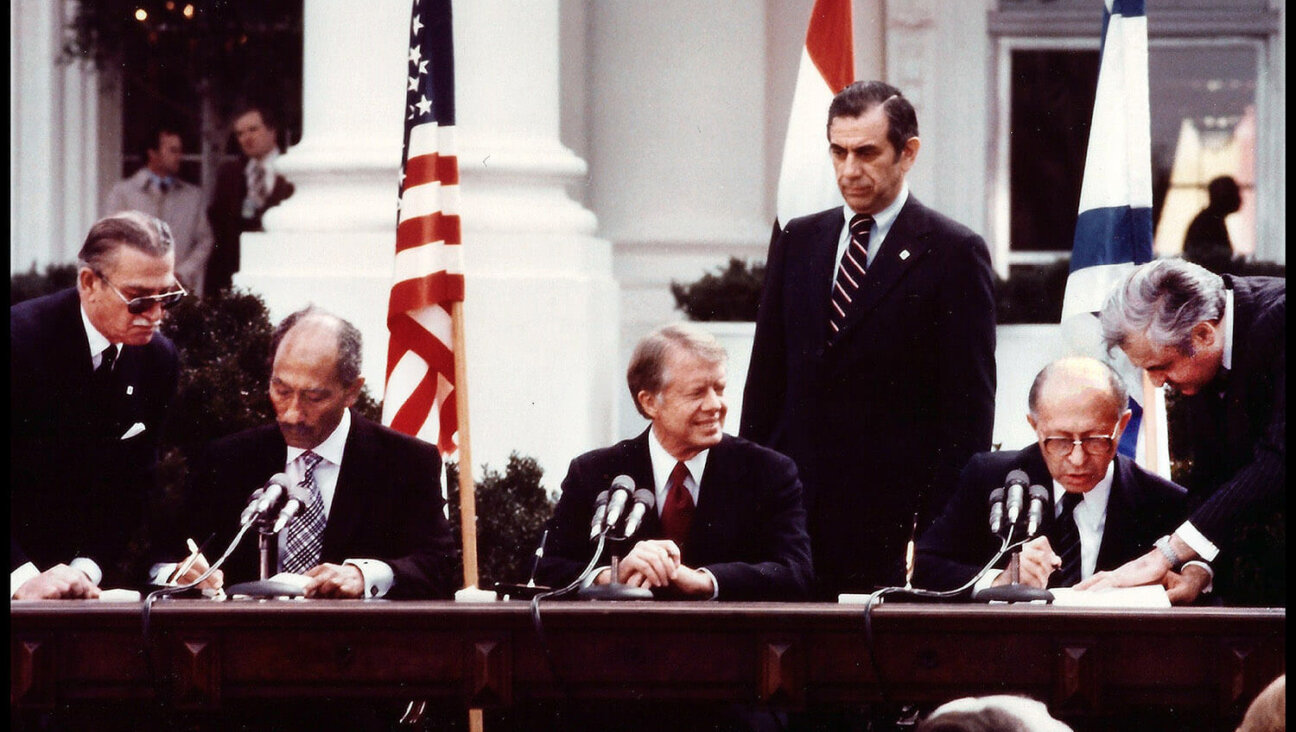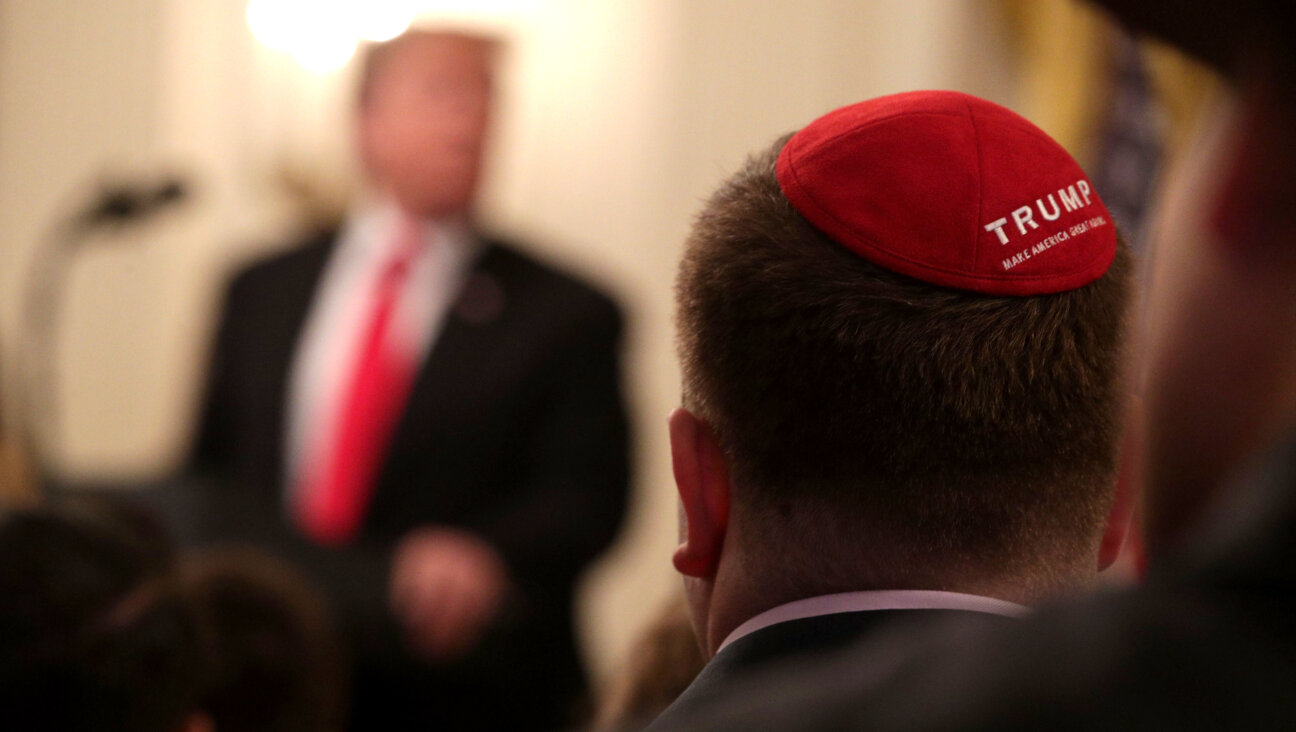Prisoner Deal Scrambles Jewish State’s Politics
Haifa, Israel – As Israel awaited final word on its prisoner exchange with Hezbollah, the country was torn by an unusual debate reflecting the painful dilemma facing the government. Rather than pitting right vs. left or government vs. press and public, like most political disputes, the prisoner swap has pitted the government and the press — an unusual alliance in itself — against an odd coalition of right- and left-wing opposition parties, backed by academics and much of the official security establishment.
The debate spilled out into the streets and blanketed the media last week, with demonstrations in nearly every town and screaming headlines on the front pages. “Bring Them Home” was the banner headline on the front page of Yediot Aharonot on the morning of the Cabinet vote approving the swap. Ma’ariv showed photos of the parents of the two Israelis captured in Lebanon in 2006, who were to be returned — already dead, the government believed — in exchange for Lebanese and Palestinian terrorists. The photos were captioned, “Look into their teary eyes.”
It was the pleas of the soldiers’ families, lavishly covered in the press for months, together with pressure from a sympathetic public that pushed the government of Prime Minister Ehud Olmert to approve a deal, apparently against its original inclination.
The prisoner exchange was ratified June 29, after nearly two years of German-brokered negotiations. The Cabinet voted 22-3 to give various concessions to Hezbollah in return for the bodies of soldiers Ehud Goldwasser and Eldad Regev, who Olmert, just ahead of the vote, told his Cabinet were dead, after years of uncertainty. Their kidnapping in July 2006 by Hezbollah gunmen sparked the Second Lebanon War. Israel is simultaneously negotiating with Hamas in Gaza to free Gilad Shalit, the corporal who was captured just before Goldwasser and Regev and is thought to be alive.
The concessions for Goldwasser and Regev include the freeing of Samir Kuntar, one of Israel’s most notorious security prisoners, along with other prisoners and bodies of Lebanese fighters. Kuntar, a Lebanese national, was convicted of murder in a 1979 attack in Nahariya regarded as among the most brutal ever perpetrated on Israeli targets. According to witnesses, Kuntar shot dead a young Israeli father, Danny Haran, in front of the man’s 4-year-old daughter and then smashed the child’s skull against a rock with his rifle butt, killing her, too.
The most pointed opposition to the deal came from security officials, led by Mossad chief Meir Dagan and Shin Bet director Yuval Diskin. The two men warned that trading high-profile terrorists for the bodies of missing soldiers would encourage more kidnappings and increase the likelihood that future Israeli captives would be killed — since even Israeli corpses are now seen to fetch a good price.
The general public, however, mostly dismissed the warnings.
Opposition politicians, who insisted that the Olmert government was showing weakness and endangering national security by negotiating and doing business with terrorist groups, vociferously backed up the security chiefs’ warnings.
“The entire country has simply derailed,” Knesset member Yuval Steinitz, one of the opposition Likud party’s top security spokesmen, told journalists. “In the 1970s, we were strong and said that we would not give in to terrorists’ demands — and accused the rest of the world of giving in. Now we are in a situation that we return live terrorists for bodies and body parts.”
Steinitz reflected a broad consensus on the political right, which has traditionally been opposed to any negotiations or compromises with terrorist organizations.
Much of the opposition left was also opposed to the Hezbollah swap, despite the left’s traditional support for negotiations with hostile forces. Meretz lawmaker Yossi Beilin, who led negotiations with Yasser Arafat in the early 1990s, declared that the deal “will signal to our enemies that preserving the lives of our prisoners is not the most important thing, since even if they are dead, Israel will pay a price.”
Similarly, former Meretz lawmaker Amnon Rubinstein, now dean of the Interdisciplinary Center in Herzliya and one of the country’s best known legal analysts, told the Forward that “the price will just go up leaps and bonds from one deal to another.”
Notwithstanding the protests, this is the third time that Israel has negotiated a lopsided prisoner swap with terrorist organizations. In 1985, the Likud-Labor unity government of Yitzhak Shamir and Shimon Peres agreed to release 1,150 Palestinian security prisoners in exchange for three soldiers held by terrorist leader Ahmed Jibril. In 2004, Ariel Sharon, then leader of the Likud, agreed to release 400 prisoners in exchange for a single Israeli civilian held by Hezbollah plus bodies of three IDF soldiers.
Meanwhile, while politicians debate, the public appears largely supportive of the current exchange deal and unswayed by security arguments against it. “From a psychological viewpoint, emotion plays the major role here,” said Hebrew University scholar Raanan Sulitzeanu-Kenan, an expert in political psychology.
Numerous public-opinion experts have noted a paradoxical fact in recent days: Despite the fierce opposition to the swap among right-wing politicians, some of the strongest support comes from traditionally right-wing sectors of the public. “For the leaders on the right, it is difficult to justify it, but for the public on the right, the support is more widespread than elsewhere in Israeli society,” said Bar-Ilan University geography professor Yossi Katz, an authority on the making of strategic decisions in Israel.
In part, Sulitzeanu-Kenan said, right-wing Israelis are simply caught up in a wave of sympathy for the families, and this was has swept the population since talks became public. “In the last two weeks,” he said, “the media has become very sympathetic to the families, constantly running personal stories and turning it into a strongly emotional issue that was difficult for anyone to object to.”
Nonetheless, he said, certain values traditionally associated with the right have played a role in building support for the swap.
“The principle of never leaving people in the field comes from a very militaristic ethos, and affinity to the military and its values is stronger among the right than elsewhere,” he said.
Moreover, according to Katz, certain Jewish traditional values also have come into play in the debate, further reinforcing support for the deal on the right.
Katz also said that another reason for the right’s enthusiasm for a deal is that a strong army is one of its central values, and a situation where soldiers could be in service knowing that Israel has passed over opportunities to free captured troops is bad for morale. “It can weaken their commitment to their mission, due to a fear that, if captured, everything possible would not be done to free them.”
A message from our Publisher & CEO Rachel Fishman Feddersen

I hope you appreciated this article. Before you go, I’d like to ask you to please support the Forward’s award-winning, nonprofit journalism so that we can be prepared for whatever news 2025 brings.
At a time when other newsrooms are closing or cutting back, the Forward has removed its paywall and invested additional resources to report on the ground from Israel and around the U.S. on the impact of the war, rising antisemitism and polarized discourse.
Readers like you make it all possible. Support our work by becoming a Forward Member and connect with our journalism and your community.
— Rachel Fishman Feddersen, Publisher and CEO






















